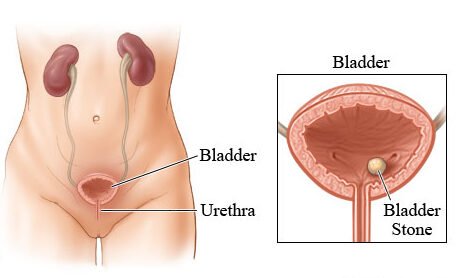About Us
Surgical Care Experts is your one-stop team for navigating the entire bladder stone treatment process. We understand bladder stones can be painful and disruptive. Our dedicated professionals will guide you from initial diagnosis to post-operative recovery, ensuring a smooth and supportive experience.
Bladder Stones:
Bladder stones are hard deposits of minerals and salts that form in the bladder. While often small and passable on their own, larger stones can cause severe pain and require medical intervention. Surgical Care Experts offer various treatment options depending on the size, location, and composition of the stone.

How are Bladder Stones Diagnosed?
Diagnosis typically involves a combination of:
- Medical history: Discussing your symptoms and risk factors.
- Urinalysis: Analyzing a urine sample for blood or signs of infection.
Imaging tests: X-rays, CT scans, or ultrasounds to locate and assess the stone.
Advantages of End-to-End Care with Surgical Care Experts:
- Experienced Urologists: Our team consists of highly skilled and board-certified urologists specializing in bladder stone treatment.
- Personalized Treatment Plans: We tailor treatment options to your specific needs and stone characteristics.
- Minimally Invasive Procedures: Whenever possible, we utilize minimally invasive procedures for faster recovery times and less discomfort.
- Advanced Technology: We leverage cutting-edge technology for accurate diagnosis and effective treatment.
Comprehensive Support: Our team is dedicated to providing compassionate care throughout your journey.
Symptoms of Bladder Stones:
- Severe pain in the lower back or abdomen that may radiate to the groin
- Painful urination
- Frequent urination
- Blood in the urine
- Nausea and vomiting (in some cases)
- Difficulty passing urine (in some cases)
Causes of Bladder Stones:
- Dehydration
- Diet (high in salt, protein, or oxalates)
- Certain medical conditions
- Family history of bladder stones
When to See a Doctor
Seek immediate medical attention if you experience:
- Unbearable pain
- Blood in the urine
- Nausea and vomiting
- Fever and chills
- Difficulty passing urine
Risk Factors:
- Dehydration
- Certain diets
- Medical conditions like obesity or recurrent urinary tract infections
- Family history
Complications:
While uncommon, potential complications of bladder stones or treatment can include infection, bleeding, and damage to the kidney or ureter.
Prevention:
- Drink plenty of fluids throughout the day.
- Limit dietary sodium, animal protein, and oxalate-rich foods (spinach, beets, nuts).
- Maintain a healthy weight.
- Consult your doctor about preventive medications if prone to stones.
Patient Testimonials



FAQ's
Treatment options vary depending on the stone’s size and location. We offer procedures like shock wave lithotripsy (uses sound waves to break up stones), ureteroscopy (removes stones with a thin scope), and percutaneous nephrolithotomy (surgical removal for larger stones).
Recovery time depends on the treatment method used. Typically, minimally invasive procedures allow for a quicker return to normal activities.
Lifestyle changes like increased water intake and dietary modifications can significantly reduce the risk of future stones. Your doctor can advise on specific preventive measures.


